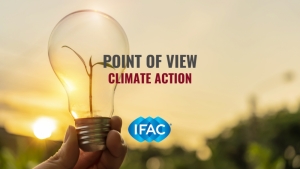عرض العناصر حسب علامة : Net Zero
الخميس, 16 سبتمبر 2021 08:10
خمسة مجالات لمحو الأمية المناخية للمحاسبين
وجهة نظر الاتحاد الدولي للمحاسبين بشأن العمل المناخي تحدد التأثير الهائل للمنظمات الأعضاء البالغ عددها 180 في الاتحاد الدولي للمحاسبين وما يزيد عن 3.5 مليون محاسب مهني في دفع التحول والتكيف مع تغير المناخ.
معلومات إضافية
-
المحتوى بالإنجليزية
IFAC’s Point of View on climate action outlines the enormous influence IFAC’s 180 member organizations and the over 3.5 million professional accountants yield in driving climate change transition and adaptation.
As Mark Carney, COP26 Finance Adviser and UN Special Envoy, put it at the 2020 IFAC/ACCA Climate Week event, the accountancy profession is essential in achieving a low-carbon transition. The contribution of an individual accountant will of course depend on their role but there are few roles that accountants undertake which do not require thinking about climate impacts and their financial consequences.
The transition to a below 2-degree Celsius Net-Zero world really needs climate-literate accountants who can take a climate-conscious approach to
advising their clients and employers on the risks, liability and reputational damage arising from corporate activity that negatively contributes to climate change;
supporting the strategic, operational and financial assessment of climate change and steering an organization toward the opportunities that decarbonization brings; and
providing investors the information they need to understand the current and prospective impact of climate-related matters on an organization and its financial position and prospects.
Becoming climate-literate isn’t a nice to do aspirational goal. A low-carbon transition is underway and will change how economies operate creating both uncertainty and significant opportunities. Politicians, regulators, and institutional investors, and asset managers have all elevated their game.
Governments and businesses are setting Net Zero emissions targets with about 120 governments and a fifth of the world’s 2,000 biggest listed companies having made Net Zero commitments. More than 40 asset managers including Vanguard and BlackRock, signed up to the Net Zero Asset Managers Initiative pledging to make their portfolios Net Zero by 2050 or earlier. The CEO of BlackRock, Larry Fink’s annual letter calls on all companies “to disclose a plan for how their business model will be compatible with a net-zero economy”.
Net Zero emissions commitments are a clear signal of the intent to achieving the Paris Agreement. About 60% of global emissions are now subject to such targets. Undoubtedly there is significant work to be done to meet such long-term ambitions not least companies putting in place clear strategies and robust short- and medium-term targets, and ensuring where possible future investments are clearly aligned. Climate Action 100+ has put in place a Net Zero company benchmark to help track business alignment with the Paris Agreement.
The significant threat of climate-related stranded assets is also driving central banks and financial supervisors to assess their role in ensuring the resiliency of the financial system and solvency of financial institutions (see Adapting Central Bank Operations to a Hotter World).
Capital markets have started to make decisions about the transition to renewable and sustainable energy with the cost of capital for fossil fuel options increasing. However, climate risk disclosure globally is inadequate. For climate risk to be fully reflected in company valuations every company, every bank, every insurer and investor needs to disclose their climate-related risks on a standardized basis.
Step-in accountants who need to acquire climate literacy in these five areas to provide relevant insights and analysis, reporting, and assurance to help organizations and their stakeholders make informed decisions to ensure business resilience.
Climate finance: Understanding the nature and magnitude of domestic and international climate finance and how climate finance flows and investments can support climate adaptation and mitigation actions.
Climate finance is the key to unlocking resource mobilization and capex decisions to finance low-carbon investments and products such as electric fleets or renewable energy generation. Mobilizing equity or debt finance to support new technologies and processes is usually critical to changing business models and supply chains. Options for green finance have significantly increased over recent years, through green bonds and sustainability-linked loans, for example, Virgin Money has launched sustainability-linked loans in Europe.
Decarbonization strategies and business models: Being aware of decarbonization strategies and plans where they exist, and the opportunities and challenges around different approaches to achieving Net Zero emissions reduction.
It is important to be familiar with various options for permanent carbon reduction and removal and their associated cost and benefits. Investments in low-carbon and novel solutions can often appear economically unviable because of high up-front capital costs so measuring economic returns, and other potential benefits over a longer period become important. Investments in R&D and innovation can be directed at enabling greater resource and energy efficiency, migration to circular business models, and avoiding the use or production of virgin materials (e.g., using bio-based raw materials like mycelium leather), and diversification into other energy forms.
It is also important to know your sector as decarbonization pathways are typically sectoral with approaches and technology options being unique to different sectors such as energy, transport, agriculture, manufacturing, and financial services. Also, be aware of carbon markets and policy and regulatory approaches and instruments for emissions abatement, and how carbon offsets can be an option for bridging the gap where technologies and resources to achieve zero emissions are not within reach.
Climate scenarios and risk assessments: Understanding climate scenarios and risk assessments and how they help to drive strategic decisions and support the assessment of investment/capex options as well as business cases for new products or mergers and acquisitions.
A comprehensive understanding of climate risk assessments and scenario modeling is necessary to support robust analysis of opportunities and risks in relation to different transition pathways. Scenario analysis is a critical element in bridging risk management and strategy and provides useful insights into how resilient strategies and business models are in the context of physical and transition risks. Risk assessments also support robust and useful disclosure by helping to quantify climate impacts and their potential financial impact in relation to revenues, expenditures, assets and liabilities under various climate scenarios.
Climate performance and data management: Being cognizant of climate science to establish relevant targets to reduce greenhouse gas (GHG) emissions, and establishing KPIs to assess performance against targets and strategic goals. Providing objective and reliable data and insights to help set and achieve appropriate emissions and other climate-related targets is also critical. Targets set by management drive actions to mitigate or adapt to climate risks and opportunities, It is important to be comfortable with
Metrics used to measure and manage risks and opportunities such as the current carbon price or range of prices used for assessing climate risks and making investment and strategic decisions
Metrics that reflect the impact of risks on financial performance.
Relevant climate-related KPIs need to be integrated into performance scorecards and alignment to incentives at different levels in the organization. It is also important to integrate climate-related information into existing financial and data management systems and internal control processes to ensure data supporting decision-making and reporting is reliable and verifiable.
Incorporating climate change into reporting and disclosure: Both preparers and auditors need to be attuned to the implications of climate-related matters as part of their financial and integrated reporting, and auditing and assurance responsibilities. It is important to be familiar with The Financial Stability Board’s Taskforce on Climate-related Financial Disclosures (TCFD) recommendations that are a catalyst for improving management processes for managing climate-related risk as well as enhancing financial-related disclosure. The TCFD recommendations are being used as the basis of tougher climate-related disclosure requirements in various countries.
Significantly better disclosure on climate risks is needed both for management and risk reporting and understanding the impact on key accounting estimates and judgements in assessing and reporting on financial position and performance.
Material climate risks for the current reporting period need to be incorporated in financial accounts where they have a financial effect such as impairment of assets and impact on results and cash flows. The Climate Disclosure Standards Board (CDSB), has issued guidance on the disclosure of the financial effects of climate-related issues on a company’s financial statements under existing IFRS Standards. Where the financial effects of climate risk are uncertain, it is necessary to include in the management or “front half” of the annual report forecasting of climate risks together with management assumptions, judgments and estimates.
نشر في
موضوعات متنوعة
الخميس, 24 سبتمبر 2020 11:20
إلى أي مدى يشارك المحاسبون في تحقيق انبعاثات أقل من ثاني أكسيد الكربون؟
نشر في
موضوعات متنوعة
موسومة تحت
الأربعاء, 23 سبتمبر 2020 11:26
الالتزام بـصافي الصفر Net Zero بحلول عام 2030
نشر في
موضوعات متنوعة



